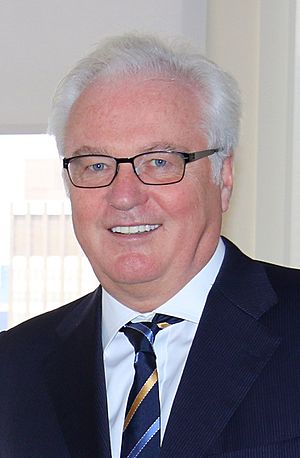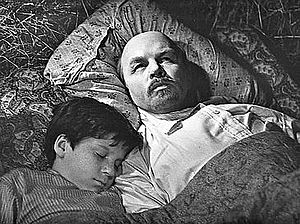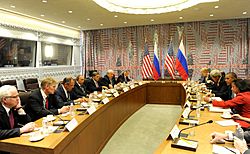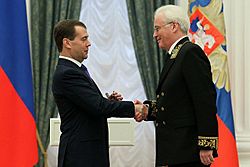Vitaly Churkin facts for kids
Quick facts for kids
Vitaly Churkin
|
|
|---|---|
 |
|
| Ambassador of Russia to the United Nations | |
| In office 1 May 2006 – 20 February 2017 |
|
| President | Vladimir Putin Dmitry Medvedev Vladimir Putin |
| Preceded by | Andrey Denisov |
| Succeeded by | Vasily Nebenzya |
| Ambassador of Russia to Canada | |
| In office 23 August 1998 – 5 June 2003 |
|
| President | Boris Yeltsin Vladimir Putin |
| Preceded by | Alexander Belonogov |
| Succeeded by | Georgiy Mamedov |
| Ambassador of Russia to Belgium | |
| In office 3 October 1994 – 25 February 1998 |
|
| President | Boris Yeltsin |
| Preceded by | Sergey Kislyak |
| Succeeded by | Nikolay Afanasevsky |
| Personal details | |
| Born |
Vitaly Ivanovich Churkin
Вита́лий Ива́нович Чу́ркин 21 February 1952 Moscow, Russian SFSR, Soviet Union |
| Died | 20 February 2017 (aged 64) New York City, U.S. |
| Alma mater | Moscow State Institute of International Relations Diplomatic Academy of the Ministry of Foreign Affairs of the Soviet Union |
| Awards | |
Vitaly Ivanovich Churkin (Russian: Вита́лий Ива́нович Чу́ркин; 21 February 1952 – 20 February 2017) was an important Russian diplomat. He was also a child actor when he was young. Churkin was Russia's Ambassador to the United Nations from 2006 until he passed away in 2017.
Before this, he worked in many key roles. He was an Ambassador-at-Large for Russia's Ministry of Foreign Affairs from 2003 to 2006. He also served as Ambassador to Canada (1998–2003) and Ambassador to Belgium (1994–1998). He was very good at languages, speaking English, French, and Mongolian.
Contents
Vitaly Churkin's Early Life and Career

Vitaly Churkin was born in Moscow, the capital of Russia. When he was 11 years old, in 1963, he acted in a movie called The Blue Notebook. He played a character named Kolya Yemelyanov. The movie was about Vladimir Lenin, a famous leader.
He also appeared in two other films: Nol tri in 1964 and A Mother's Heart in 1967. After these roles, he decided to stop acting. He wanted to focus on his studies, especially learning English.
Education and First Diplomatic Roles
Churkin studied at the Moscow State Institute of International Relations. He graduated in 1974. He then started working for the Soviet Foreign Ministry. In 1981, he earned a PhD in History. He got this degree from the USSR Diplomatic Academy.
Later, he became the Director of the Information Department for the Ministry of Foreign Affairs. He was also a spokesperson for the Russian Foreign Ministry. From 1992 to 1994, he served as the Deputy Foreign Minister.
Ambassador Roles
Churkin was Russia's Ambassador to Belgium from 1994 to 1998. After that, he became the Ambassador to Canada from 1998 to 2003. He then worked as an Ambassador-at-Large from 2003 to 2006. This role meant he had special assignments for the Ministry of Foreign Affairs.
On May 1, 2006, he became the Permanent Representative of Russia to the United Nations. He took over from Andrey Denisov. He presented his official papers to the UN Secretary-General, Kofi Annan. He also led the Senior Officials of the Arctic Council.
Churkin's Role in the Chernobyl Disaster
In 1986, when Vitaly Churkin was 34, he became well-known. He was chosen to speak to the United States Congress. This was about the Chernobyl disaster, a nuclear accident in the Soviet Union. It was the first time a Soviet official had ever spoken to a U.S. Congressional committee.
Churkin was chosen because he spoke English very well. He was known for using many English phrases. During his speech, he often denied things or changed the subject. This led to him being made fun of in a political cartoon series.
Actions as a United Nations Ambassador

As Russia's Ambassador to the UN, Vitaly Churkin was involved in many important global discussions.
Discussions on Georgia
In 2008, during the Russo-Georgian War, Churkin suggested a plan. He wanted to stop weapons from being sent to Georgia. The United States did not agree with this plan. They thought it was a way to distract from Russia's actions in Georgian territory. The plan was formally introduced in 2009, but nothing happened with it.
Discussions on Crimea
In March 2014, there were talks about Crimea. This region was deciding if it would join Russia or Ukraine. Churkin was asked if Crimea had the right to hold a vote on its future.
Discussions on Iran
On June 25, 2014, Churkin spoke about talks on Iran's nuclear program. He said the first round of talks was successful. These talks involved Iran and six major world powers.
Discussions on Iraq
On June 12, 2014, Churkin gave an update on the situation in Baghdad, Iraq. He said that a UN official there was safe. He also noted that the violence was happening further north in the country.
Vote on Srebrenica Massacre
In 1995, during the Yugoslav Wars, a terrible event happened. About 7,500 people were killed in the Srebrenica massacre. The International Court of Justice later called this a genocide. The UK proposed a resolution at the UN. This resolution would recognize the event as genocide and remember its 20th anniversary.
Russia was the only country on the UN Security Council that voted against this resolution. Churkin used Russia's veto power on July 8, 2015.
Vitaly Churkin's Death
Vitaly Churkin passed away in New York City on February 20, 2017. This was just one day before his 65th birthday. Russian officials stated that the cause of death was heart failure. The Russian Foreign Ministry shared their sadness and said he died while working.
Many diplomats from other countries also expressed their condolences. India's UN Ambassador called him a "friend" and a "stalwart diplomat." The former U.S. UN Ambassador, Samantha Power, said she was "devastated." She described Churkin as a "diplomatic maestro." Britain's UN Ambassador, Matthew Rycroft, called him "a diplomatic giant."
After his death, Vitaly Churkin was given two awards. He received the Russian Order of Courage and the Order of the Serbian Flag 1st class.
Images for kids
See also
 In Spanish: Vitali Churkin para niños
In Spanish: Vitali Churkin para niños





